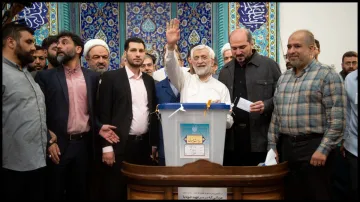Tehran: In an unprecedented situation, the counting of votes in Iran's snap presidential elections, which took place on Friday (June 28) in the wake of Ebrahim Raisi's death in a helicopter crash, concluded with sole moderate candidate Massoud Pazeshkian ahead of hardline candidate Saeed Jailili in the tightly controlled race. Jalili is considered close to Iran's Supreme Leader Ayatollah Ali Khamenei, who controls all state matters.
So far, over 14 million ballots have been counted in Iran's election in which Pazeshkian gained over 5.9 million votes while Jalili has won more than 5.5 million votes, according to provisional results by Tehran's Interior ministry. The turnout was around 40 per cent, lower than expected by Iran's clerics and one of the lowest since the 1979 Islamic Revolution.
It is important to note that the elections come amid growing public frustration amid economic hardship and restrictions on political and social freedom. Iran is also in the midst of escalating regional tensions due to the war between Israel and Iranian allies Hamas in Gaza and Hezbollah in Lebanon.
What does this election mean for Iran?
Iran's presidential election is a contest among a tightly controlled group of three hardline candidates and one low-profile moderate loyal to the supreme leader. Khamenei handles all important state matters like Tehran's nuclear programme or support for militia groups, but the president sets the tone of Iran's domestic and foreign policy and manages day-to-day government actions.
More than 61 million Iranians over the age of 18 are eligible to vote, with about 18 million of them between 18 to 30. Meanwhile, Iranian activists and opposition groups are distributing the Twitter hashtag #ElectionCircus widely on social media, in a bid for a regime change.
Manual counting of ballots means the final result is expected to be announced only in two days after the polls commenced on Friday, though initial figures may come out sooner. If no candidate manages to win at least 50 per cent plus one vote from all ballots cast, including blank votes, a run-off round between the top two candidates will be held on the first Friday after the election result is declared.
Who are the candidates?
Three candidates are hardliners and one is a low-profile comparative moderate, backed by the reformist faction that has largely been sidelined in Iran in recent years. Prominent among the remaining hardliners are Mohammad Baqer Qalibaf, parliament speaker and former commander of the powerful Revolutionary Guards, and Saeed Jalili, a former nuclear negotiator who served for four years in Khamenei's office.
The sole comparative moderate, Massoud Pezeshkian, is faithful to Iran's theocratic rule, but advocates detente with the West, economic reform, social liberalisation and political pluralism. His chances rely on reviving the enthusiasm of reform-minded voters who have largely stayed away from the polls for the last four years after previous pragmatist presidents brought little change. "We will respect the hijab law, but there should never be any intrusive or inhumane behaviour toward women," Pezeshkian said after casting his vote.
Based on preliminary reports, it seems that Jalili and Pezeshkian are heading for a run-off election. Pezeshkian could benefit from his rivals' failure to consolidate the hardline vote. "We will respect the hijab law, but there should never be any intrusive or inhumane behaviour toward women," Pezeshkian said after casting his vote, in an apparent reference to the death of Mahsa Amini, 22, in 2022, which sparked widespread protests in Iran.
A hardline watchdog body called the Guardian Council made up of six clerics and six jurists aligned with Khamenei is tasked with choosing the candidates for the presidential elections. Only six candidates were selected from a pool of 80, and two hardline candidates - Tehran's mayor Alireza Zakani and head of the Martyrs' Foundation Amirhossein Ghazizadeh-Hashemi - dropped out of the race on Thursday.
(with inputs from Reuters)
ALSO READ | Iran begins voting for next president after Ebrahim Raisi's death amid escalating regional tensions | WATCH
Latest World News
